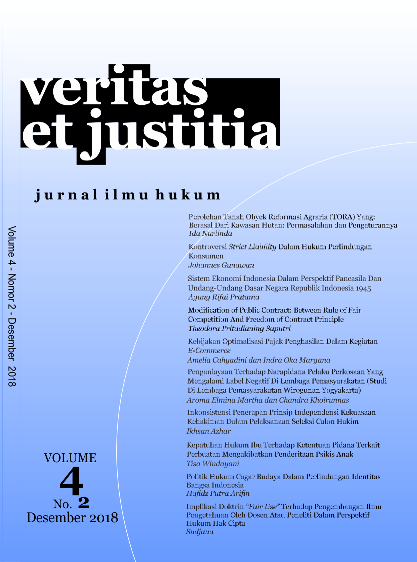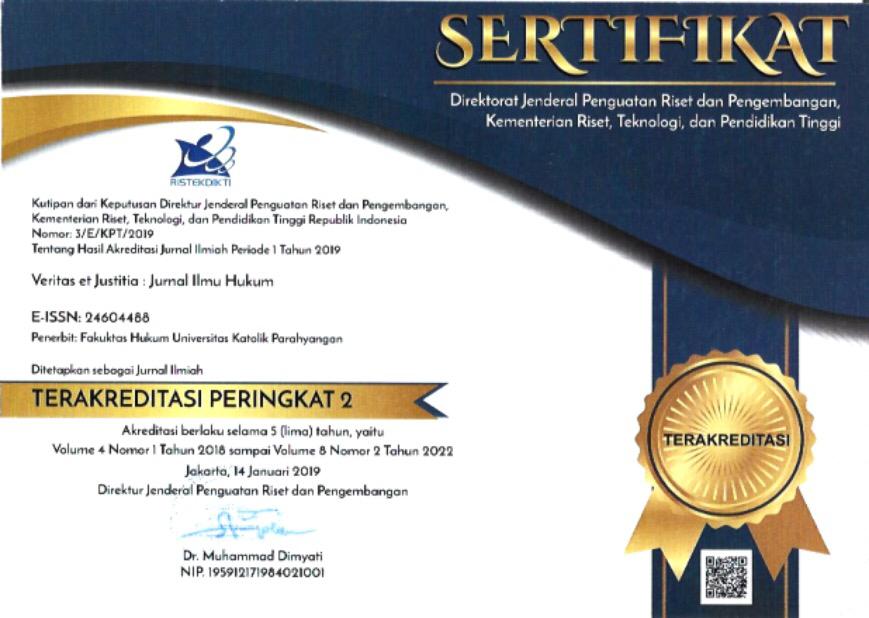KEPATUHAN HUKUM IBU TERHADAP KETENTUAN PIDANA TERKAIT PERBUATAN YANG MENGAKIBATKAN PENDERITAAN PSIKIS ANAK
DOI:
https://doi.org/10.25123/vej.v4i2.3081Abstrak
Art 80 and Art 76C of Law No. 35/2014 purports to protect children from domestic violence (including most importantly those committed by the mother of the child). This article using empirical juridical purports to analyze what factors are influential in determining compliance. Primary data is collected using purposive sampling technique and subsequently is analyzed qualitatively. The main result of the research is that avoidance of penal sanction is not a significant role in determining legal compliance. More significant or influential are factors such as the extent or level of understanding the rule’s purpose or values behind the existing rule (prohibiting domestic violence), the need to maintain good relationship with the child; identification of the mother with certain groups in society and personal values.
Referensi
Buku:
Achmad Ali, Menguak Teori Hukum (Legal Theory) dan Teori Peradilan (Judicial Prudence) termasuk Interpretasi Undang-undang (Legisprudence), Kencana, Jakarta, 2009.
Herlina, Bibliotherapy, Pustaka Cendekia Utama, Bandung, 2013.
Mochtar Kusumaatmadja, Hukum, Masyarakat dan Pembinaan Hukum Nasional, Binacipta, Bandung, 1976.
Peter Mahmud Marzuki, Penelitian Hukum, Kencana, Jakarta, 2009.
Rianto Adi, Metode Penelitian Sosial dan Hukum, Granit, Jakarta, 2004.
Robert Slavin, Psikologi Pendidikan Teori dan Praktik, Pt. Indeks, Jakarta, 2011.
Salim dan Erlies Septiana Nurbani, Penerapan Teori Hukum Pada Penelitian Tesis dan Disertasi, Jakarta: Raja Grafindo Persada, 2016.
Satjipto Rahardjo, Sosiologi Hukum Perkembangan Metode dan Pilihan Masalah, Genta Publishing, Yogyakarta, 2010.
Soerjono Soekanto dan Sri Mamuji, Penelitian Hukum Normatif Suatu Tinjauan Singkat, Raja Grafindo Persada, Jakarta, 2010.
Soerjono Soekanto, Suatu Tinjauan Sosiologi Hukum Terhadap Masalah-Masalah Sosial, Alumni, Bandung, 1982.
Soerjono Soekanto, Faktor-Faktor yang Mempengaruhi Penegakan Hukum, Raja Grafindo Persada, Jakarta, 2007.
Sudikno Mertokusumo, Meningkatkan Kesadaran Hukum Masyarakat, Edisi Pertama, Liberti, Yogyakarta, 1981.
Wignjosoebroto, Hukum: Paradigma, Metode dan Dinamika Masalahnya, edisi pertama, ELSAM, Jakarta, 2002.
Peraturan Perundangan-Undangan:
UU No. 35 Tahun 2014 Tentang Perubahan Terhadap UU No.23 Tahun 2002 Tentang Perlindungan Anak
Jurnal:
Achir Yani S. Hamid, Aspek Psikososial Pada Korban Tindak Kekerasan Dalam Konteks Keperawatan Jiwa, Jurnal Keperawatan Indonesia, Volume 8, No. 1, 2004.
Edwin Manumpahi dkk, Kajian Kekerasan Dalam Rumah Tangga Terhadap Psikologi Anak Di Desa Soakonora Kecamatan Jailolo Kabupaten Halmahera Barat, e-journal “Acta Diurna” Volume V. No.1, 2016
Ellya Rosana, Kepatuhan Hukum Sebagai Wujud Kesadaran Hukum Masyarakat, Jurnal TAPIs Vol.10 No.1 Januari-Juni 2014.
Muhammad Taufik dkk dalam Yanti Tombeng, Kekerasan Fisik Terhadap Anak Ditinjau Dari Aspek Perlindungan Hak-Hak Anak, Lex Crimen Volume No. 2 April 2014.
Internet:
https://nasional.tempo.co/read/765863/kpai-kekerasan-terhadap-anak-di-indonesia-masih-tinggi, diakses pada April 2018.
https://kbbi.kemdikbud.go.id/entri/perbuatan, ditelusuri pada 29 Oktober 2018.
Lain-Lain:
Violence Prevention Initiative (2009) dalam Statistik Gender Tematik – Mengakhiri Kekerasan Terhadap Perempuan dan Anak di Indonesia, Kementerian Pemberdayaan Perempuan dan Perlindungan Anak, 2017.
##submission.downloads##
Diterbitkan
Terbitan
Bagian
Lisensi
Authors who publish with this journal agree to the following terms:
Authors retain copyright and grant the journal right of first publication with the work simultaneously licensed under a Creative Commons Attribution License that allows others to share the work with an acknowledgement of the work's authorship and initial publication in this journal.
Authors are able to enter into separate, additional contractual arrangements for the non-exclusive distribution of the journal's published version of the work (e.g., post it to an institutional repository or publish it in a book), with an acknowledgement of its initial publication in this journal.
Authors are permitted and encouraged to post their work online (e.g., in institutional repositories or on their website) prior to and during the submission process, as it can lead to productive exchanges, as well as earlier and greater citation of published work.
The Journal allow the author(s) to hold the copyright and to retian publishing rights without restrictions.










